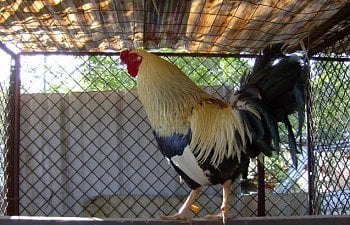
We see it a lot here on BYC, "Help! My cuddly "Simon" the chick has grown up to be an aggressive monster! What do I do?!" The first step in dealing with an aggressive rooster is to learn why he acts the way he does. If we understand why he gets so feisty, and learn how to get into his mind, then maybe we can make some changes in his behavior.
And if nothing else, learn how to live with him in a safe manner. Not all roosters turn into monsters however, a good many of them remain sweet to their keepers or if nothing else show them great respect on their own.
First, let's look at what drives a rooster. Male chickens are naturally more aggressive than females, it's just the natural order of things. It is his job to defend his flock against threats from predators and other roosters that might be looking to mate with his hens. It's his responsibility to care for the flock and its needs and that includes mating with as many hens as possible to ensure the success of his flock. Roosters are wired to protect the hens.
If you pick up a hen and she squawks he will be more likely to come to her defense. Over time, your rooster may start to see you as the enemy or anyone else in his territory for that matter. Roosters think rationally, they can not afford to make any mistakes lest they lose their lives. Rarely do roosters become aggressive with the hens, however occasionally it does happen. This is probably something you cannot train out of them and do suggest you remove any rooster that attacks the hens from the flock.
So all this being said, we need to learn how to move around the flock, watch for his "moves" and know just how to treat the situation calmly in a non-aggressive way. You may be unknowingly challenging him every time you go out to see your hens. And remember, he is the master of sneak attacks!
What ARE some of his moves? Your rooster may try and bring you treats...cute but beware, he does this for subordinate hens. He may lower his head and look at you, start in with his little rooster dance, he is ready to attack so be alert! The silent stealthy running up behind you only to quickly stop and stare, he is challenging you!
Here are some terms to describe just what a rooster does when he attacks:
- Flogging- The rooster will fly at you and try to beat you with his wings and rake you with his spurs.
- Spurring- As the name suggests, he will jump at you and try and rake you with his spurs.
- Chasing- This is more common with children however adults get this action too, he will chase you far until he feels you are no longer a threat.
- Aggressive Pecking: This is not cute, his beak can draw blood. Do not tolerate this even at the chick stage.
Starting with the Chicks:
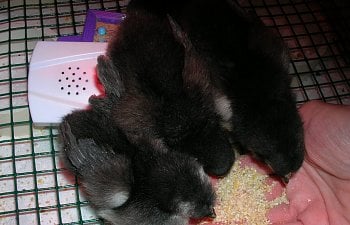
Training out aggression in male birds is many times a lot easier with chicks than with adult birds you have been given. Adult birds have already developed personality traits and learned to be aggressive, whereas chicks can be many times persuaded in learning that you are the Alpha bird and that you will not deal with any aggressive behavior. However please keep in mind that some birds are just not trainable no matter how much time and effort is put into changing their behavior but we will get into that later.
When chicks are small, males may be a bit stand-offish, some say to never coddle them as this lowers you in the pecking order. Whether you snuggle them or not, start setting the ground rules early on, laying the foundation for gaining your respect and dominance. Never allow them to peck you even as chicks. Pick him up immediately, carry him around a bit, and get his mind off what he just did, thus his first lesson in being tame. Feed him treats last, letting the other chicks eat first. Generally, male chicks stay fairly docile in the brooder and a few weeks after.
Somewhere between the ages of 16 and 20 weeks, (sometimes even earlier than this), his rooster hormones will upset this "sweet chick" stage. Suddenly he is full of testosterone and needs to defend his flock and territory, they start to test the limits with you as well.
Here are a few tips and suggestions to help you stay as an Alpha bird in your flock if you find your rooster is beginning or has become aggressive.
When moving around your flock make your movements deliberate and fairly slow-paced. Quick movements are unsettling to your rooster, putting him on edge.
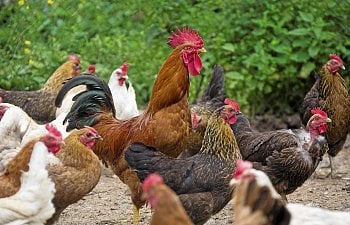
Do not quickly walk straight toward your rooster and stare at him, he may think you are issuing a challenge if you do. Don't sneak around him either as this will make him think you are afraid of him. If he charges you, raise your arms and flap around just as he does. Take a few steps toward him and stand your ground and THEN stare into his eyes. Do not turn around or walk away until he has surrendered.
Give him space, don't crowd him in. The only time you may want to move closer into his space is if he looks as if he is going to attack you. You cannot show fear or be intimidated by his actions, you want HIM to feel as if you ARE higher in the pecking order than he is. If he challenges you in this space, take one large step toward him, staring directly into his eyes. He should back up, look away or toward the ground and you won the argument. Even though you may be frightened, do not run or move away, he needs to move first. If he drops his wings in a challenge, do the same. He can sense your fear!
Always wear boots to protect your legs, long sleeves to protect your arms, gloves, long pants, and carry a deterrent. A broom makes a nice tool to carry around, you can shoo the rooster away with it, it works as a barrier between you and your boy and roosters can also learn that you are not to be messed with while carrying a broom. Always be prepared physically. If he does try and flog you, you will have on protective clothing and your broom will stand in the way. Never let your guard down on an aggressive rooster even after he has shown subordinance.
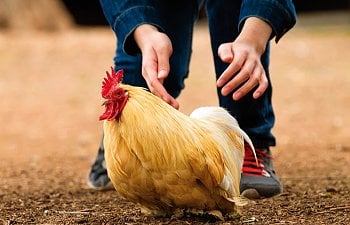
Pick him up the moment he attacks you and parade him around in front of his hens. This may have an effect on his psyche in that he becomes embarrassed around his hens. Carry him around in your arms for 15 minutes as you do some chores, get him relaxed. Carry him around a LOT when you have the time! Stroke his feathers, touch his comb, wattles, and feet, especially when he is young. This will have the tendency to humble him. Whenever he is acting skittish and has that look in his eye, his little dance going, pick him up. Parade him around the hens, around the yard. This dulls his aggression and tames him down.
Never chase him. You are only making him more aggressive toward you. Assume he can always harm you at any time. Just because you raised him from a tiny snuggly chick, doesn't mean he has respect for you. Do not let him eat with the others when you are around, and don't let him breed the hens when you are present. Feed him treats last. You can offer him treats, but do not baby him. You can crouch down to his level and hand feed him treats. This works on some of them as a distraction and he may learn that you are more of a treat dispenser than a threat.
Be careful though and do not let him fly up in your face when you are in this crouched position. Some people find that grabbing onto the rooster's comb and forcing the head down to the ground shows your dominance. Let go and repeat this process until he relaxes and stops struggling.
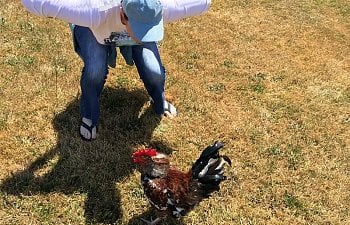
You are the boss, he needs to learn this if you are going to coexist together. You are not going to take over his livelihood in the life of mating the hens or protecting his flock, but he needs to know you will not tolerate challenges to your position. And remember, everyone else that engages with your flock must follow all these rules as well. You do not want to confuse him. If you remain unafraid of him, chances are you will have his respect.
And lastly, respect him. He has a job to do and was designed this way. Do not be mean to your rooster. I cannot over-emphasize this. You can certainly control a bird with fear but this does not earn your respect, in fact, it can make them meaner. You want a "tame" rooster, not one that is afraid of you. Do not hit him, throw things at him, and do NOT hold him upside down. This is dangerous for his life. Due to his anatomy, it is possible to cause the air sacs to collapse and he can suffocate. If he has recently eaten or drank water, he can regurgitate and inhale food or water into his lungs killing him.
Don't cut his spurs off in anger, (although you might file down the sharp tip to make it duller, this will also benefit the hens.) It is important to remain calm and quiet at all times. Consistency will get you further in your training. Do not resort to cruel methods to control your boy. You might consider creating bachelor quarters for excess cockerels, especially those that are aggressive to you, giving them a place to grow and thrive without the hens.
Cockerels that have grown up from chicks together generally tolerate each other, but just the same, always keep an eye out for fighting. Sometimes just mixing things up can jog their minds.
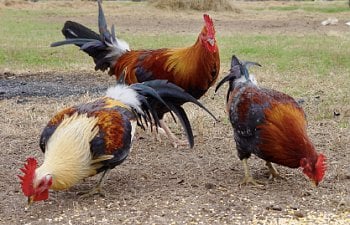
Remember, not every bird is trainable or will respond to anything I have mentioned here and much of your success (or failure) may depend on his genetics. Some birds are just born this way and cannot be changed. Roosters were not born to be "lap sitters". They are designed to be aggressive, especially the Game breeds. Do your research first and find a breed that has a tendency for less aggressive roosters. Children should be kept away from all aggressive roosters, kids are just an easy target that agitated roosters do not understand. Mean roosters can inflict horrible wounds on small kids.
Working with your rooster will take time and effort. And if you are not willing or do not have the time to devote the work it takes to possibly change his behavior, then think about removing him from the flock or eating him. Nobody needs an aggressive rooster, keeping chickens is supposed to be fun. So do the right thing if need be.
I hope this article has given you some tips on training your roosters and sets you on a good path for a wonderful relationship with them!
Please stop by the following links for more help in training your rooster!
https://www.backyardchickens.com/articles/the-definite-guide-to-roosters.49193/
https://www.backyardchickens.com/articles/how-to-train-a-rooster-to-be-nice.66507/
https://www.backyardchickens.com/th...-or-true-signs-of-an-aggressive-bird.1151032/
For more help with your boys, you can start a thread in our Managing your Flock forums as well:
https://www.backyardchickens.com/forums/managing-your-flock.2/

